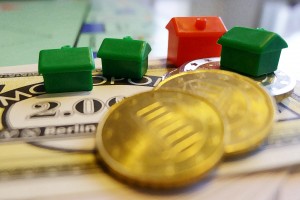
![]() Despite tempting offers of 100% financing, German investors are cautious when it comes to home ownership
Despite tempting offers of 100% financing, German investors are cautious when it comes to home ownership
As the prevailing low-interest environment drags on, a veritable real estate boom has been triggered in Germany. While German savers are generally extremely cautious with their money, making the German savings rate a very high one by international standards, they are now faced with a dilemma: rock-bottom interest yields on their cash. While more than half of savers still look to their savings accounts and other “secure” forms of investment, they are becoming increasingly worried that inflation will slowly but surely erode their capital. Low mortgage rates, by contrast, are looking ever more attractive. According to a demographic survey performed by the Allensbach Institute on behalf of Postbank, one out of three professionals would like to buy and live in their own property in order to help provide for the future. The survey also found that two thirds of Germans see real estate as “an ideal form of making private retirement arrangements.” By contrast, only five percent had plans to take out a capital-forming life insurance policy. The so-called Riester insurance scheme has also been falling out of favor as a form of old-age provision, with only nine percent of professionals expressing an interest.
Below European average
Nonetheless, most experts doubt that the rate of German home ownership will rise appreciably in the coming years. At roughly 43 %, this rate is currently well below the European average of 60 %. (In Spain, no less than 80 % of people own their own homes!) This low ratio of ownership is also one of the reasons why the supposedly “rich” Germans rank only in the middle when it comes to average household wealth. According to a survey by the European Central Bank (ECB), the average private household in Spain disposes over total assets of almost € 183,000.00, compared to just over € 51,000.00 for the average German household – whereby the ownership gap clearly plays a role.
The current real estate bull run is not free of risks or side effects, of course. For one, high closing costs must be paid when buying a house or condominium. German savers are known to complain when they have to pay an “issue surcharge” (e.g. 2 %) when buying into an investment fund, yet they must reckon with paying more than 10 % when purchasing a ‘home-sweet-home’.
Bigger down-payments
Making money back through appreciating property values could take a long time – or even prove impossible. Many experts are already warning that Germany could be headed for a real estate bubble that may eventually burst with a bang, as in Spain or Great Britain.
Thus, the prices of condominiums in major urban centers such as Berlin, Düsseldorf, Frankfurt (Main), Hamburg, Cologne, Munich and Stuttgart have shot up by as much as 20 % over the past twelve months. Still, the authors of at least one current study argue that there are no signs as yet that a bubble is underway on the German property market, and that the warning of looming price corrections recently issued by Germany’s central bank, Bundesbank, was overblown. The observed rise in prices, so the authors contend, is merely a reaction to market scarcity, and not speculative over-exuberance. In their view, the bull trend is also justified by other underlying fundamentals, such as low interest rates and rising incomes. Thus, the think-tanks behind the study, including the business-friendly Cologne Institute for Economic Research (Institut der Deutschen Wirtschaft Köln), conclude that the domestic real estate market is significantly more stable  than that of other countries, having exhibited far fewer price swings over the past two decades. This is supposedly due to a smoothly-functioning rental market and a more solid mortgage sector. More specifically, German home and condominium buyers have tended to make bigger down-payments than their counterparts in Spain, Ireland or the United States, who often assumed excessively high mortgages to buy a home (at least partially due to insufficient rental opportunities). Thus, when the Spanish, Irish, and U.S. real estate markets crashed, buyers found themselves swamped with debt they could not repay, thereby plunging the lending banks into a crisis and accelerating the general slide into economic recession.
than that of other countries, having exhibited far fewer price swings over the past two decades. This is supposedly due to a smoothly-functioning rental market and a more solid mortgage sector. More specifically, German home and condominium buyers have tended to make bigger down-payments than their counterparts in Spain, Ireland or the United States, who often assumed excessively high mortgages to buy a home (at least partially due to insufficient rental opportunities). Thus, when the Spanish, Irish, and U.S. real estate markets crashed, buyers found themselves swamped with debt they could not repay, thereby plunging the lending banks into a crisis and accelerating the general slide into economic recession.
The key: location
Still, property ownership should not be seen as a sure-fire way of “putting money away for a rainy day.” Thus, a study recently performed by the Empirica consultancy on behalf of the German Institute for Old Age Provision (Deutsches Institut für Altersvorsorge, DIA) validates the commonly-held notion that real estate is always the best way to save for the future. One of the fundamental distinctions to be kept in mind in this context is whether a house or condominium is owner-occupied or rented out. Reiner Braun, one of the Empirica study’s authors, explains: “If you live in the property, that by itself makes it a valuable component of your nest egg.” In this case, the rate of return earned on the home plays only a secondary role, since a person who plans to keep living there in old age will not be overly worried about a possible loss of value. By contrast, investors who look forward to travelling the world during their golden years will have to keep a close eye on the re-sale value right from the start. This value will depend on the physical condition of the real estate and on its location. “The more rural the property, the harder it will be to sell,” warns Dirk Scobel, a real estate expert at the Hamburg Consumer Protection Center (Verbraucherzentrale).
Astronomical prices
Reiner Braun concurs, adding that, based on his study, the location is often not as good as the inhabitants believe it to be: “Only ten percent of German households actually live in a lucrative location.” Location, location, location! If this is a key factor for owner-occupied properties, it is even more critical for rental properties. Yet this also spells a problem for investors seeking to escape the low-interest-rate trap by putting their money into a rental cash cow. The reason: properties located in top areas have become astronomically expensive in the meantime, meaning that lots of capital has to be tied down before any rental income can be generated. “Investors must balance their expected rental-income flows against the purchase price,” warns Ulrich Kater, Head Economist at Dekabank. Given the prevailing high prices, even residential property is unlikely to yield returns in excess of two percent per annum – i.e. barely enough to retain its value. Many other market watchers are skeptical as well. “A rented-out condo is hardly suitable as a major part of a retirement plan,” cautions Jörg Sahr, an expert at Stiftung Warentest, a leading consumer advice group. The fact that so much capital must be committed makes it difficult for small investors to diversify their portfolios.Thus, Sahr recommends this form of old-age provision only to investors who already have other savings. And anyone considering being a landlord must think through all the possible implications. “You have to be in a position to get through periods of vacancy or non-payment of rent,” emphasizes consumer advocate Dirk Scobel: “You’ll always find takers for a two-bedroom flat in Hamburg, but you may have trouble finding tenants quickly in other locations.”
Klaus-Dieter Oehler has worked for more than 20 years as a financial editor for the daily Stuttgarter Zeitung
